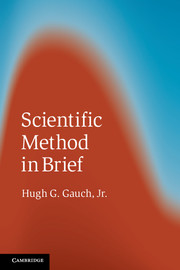Book contents
- Frontmatter
- Contents
- Foreword
- Preface
- 1 Introduction
- 2 Four bold claims
- 3 A brief history of truth
- 4 Science's contested rationality
- 5 Science's presuppositions
- 6 Science's powers and limits
- 7 Deductive logic
- 8 Probability
- 9 Inductive logic and statistics
- 10 Parsimony and efficiency
- 11 Case studies
- 12 Ethics and responsibilities
- 13 Science education
- 14 Conclusions
- References
- Index
6 - Science's powers and limits
Published online by Cambridge University Press: 05 November 2012
- Frontmatter
- Contents
- Foreword
- Preface
- 1 Introduction
- 2 Four bold claims
- 3 A brief history of truth
- 4 Science's contested rationality
- 5 Science's presuppositions
- 6 Science's powers and limits
- 7 Deductive logic
- 8 Probability
- 9 Inductive logic and statistics
- 10 Parsimony and efficiency
- 11 Case studies
- 12 Ethics and responsibilities
- 13 Science education
- 14 Conclusions
- References
- Index
Summary
What are science's powers and limits? That is, where is the boundary between what science is and is not able to discover? The American Association for the Advancement of Science has identified that issue as a critical component of science literacy: “Being liberally educated requires an awareness not only of the power of scientific knowledge but also of its limitations,” and learning science's limits “should be a goal in all science courses” (AAAS 1990:20–21). The National Research Council concurs: “Students should develop an understanding of what science is, what science is not, what science can and cannot do, and how science contributes to culture” (NRC 1996:21).
People's motivations for exploring the limits of science can easily be misconstrued, so they should be made clear from the outset. Unfortunately, for some authors writing about science's limits, the motivation has been to exaggerate the limitations in order to cut science down, support antiscientific sentiments, or make more room for philosophy or religion. For others, the motivation has been to downplay science's limitations in order to enthrone science as the one and only source of real knowledge and truth. Neither of those excesses represents my intentions. I do not intend to fabricate specious problems to shrink science's domain, nor do I intend to ignore actual limitations to aggrandize science's claims. Rather, the motivation here is to characterize the actual boundary between what science can do and cannot do. One of the principal determinants of that boundary is the topic of this book, the scientific method.
- Type
- Chapter
- Information
- Scientific Method in Brief , pp. 96 - 111Publisher: Cambridge University PressPrint publication year: 2012



